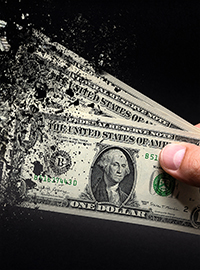| Biden Economy Threatens His 2024 Viability |
 |
|
By Timothy H. Lee
Thursday, April 13 2023 |
Whom will American voters believe in 2024, Joe Biden or their lying bank balances? In the years preceding Biden’s presidency, average U.S. wage gains outpaced inflation, which meant increasing purchasing power for American consumers. As this graph starkly illustrates, however, when Biden entered the White House those two trend lines immediately reversed. Inflation shot dramatically upward, and prices outpaced wages in a way that we hadn’t witnessed in years. Today, over two years later, Americans have lost over $7,500 in purchasing power, with inflation rising over 14% while wages only rose approximately 10%. Americans now pay over $700 more every month for the same items than they did before Biden’s presidency. Those are ugly numbers, however Biden apologists attempt to spin them. This week, the Labor Department announced that the consumer price index rose 5% over one year ago. Although the Biden Administration will spin that number as an improvement over the forty-year peak of 9.1% in June of last year, the important comparison metric is that inflation stood at just 1.4% when Biden entered office. Additionally, that 5% rate of inflation remains 2.5 times higher than the Federal Reserve’s preferred 2% norm. With grim economic numbers persisting, and Biden’s popularity remaining perilously low – only 25% of Democrats want him to run for reelection – his window for correction is closing rapidly. When pressed during interviews how Biden can hope to win reelection with such deep disapproval, his defenders reply with synthetic cheerfulness that he just needs to get out there and explain to Americans how much his policies are helping them. Their obvious headwind is that people know firsthand what the Biden presidency has meant for them. Gallup reports that half of all Americans report that they’re worse off financially than one year ago, a nearly unprecedented high: Reflecting on their personal financial situations, 35% of Americans say they are better off now than they were a year ago, while 50% are worse off. Since Gallup first asked this question in 1976, it has been rare for half or more of Americans to say they are worse off. The only other times this occurred was during the Great Recession era in 2008 and 2009. Separately, a new CNBC survey released this week showed that amid stubbornly high inflation, 58% of Americans report living paycheck-to-paycheck, while 70% report that they currently feel “financially stressed.” In response, the Biden Administration and its supporters often point to the U.S. labor market as a triumph of their economic agenda. Even there, however, reality doesn’t quite match their spin. According to the federal government’s own official data, the pace of employment gains significantly decelerated once Biden entered the White House. Of the 22 million jobs lost during the Covid recession, nearly 60% were regained in 9 months under President Trump, whereas it took Biden 17 months to regain the remaining 43%. Instead of offering relief, however, this week the Biden Administration accelerated its extremist agenda. He proposed sweeping new emissions rules that would force automakers to make 60% of all new cars electric vehicles (EVs) by the year 2030, increasing to 67% by 2032. For perspective, less than 5% of automobiles sold in 2022 were electric, and Gallup reports that only 12% would even seriously consider buying an EV. Also keep in mind that the average price of an EV in 2022 was $66,000, almost $20,000 more than the overall average new car price, while the median U.S. salary for 2022 was $54,000. Meanwhile, this week brought more bad news for Biden when the Congressional Budget Office (CBO) reported that the federal budget deficit reached $1.1 trillion in the first half of fiscal 2023. That’s $430 billion higher than the same period last year, as spending rose 13% while Biden’s slowing economy reduced incoming revenues by 3%. Biden often casts himself as some sort of deficit hawk, but the reality is that the situation is deteriorating. A year from now, voters will inevitably ask themselves the quadrennial question of whether they’re better off than they were four years ago. On this course, Biden may not welcome their answer or their attribution of blame. |
Related Articles : |
























